
Hello~ 沙丘研究所(Dunes Workshop)是一个独立的线上原创内容发布平台,内容有关于城市、建筑、文学、艺术以及留学生活,成员来自哈佛大学设计学院以及麻省理工大学设计学院。 同样,欢迎关注我们的微信公众号“沙丘研究所”,第一手的推送内容会发布在这里;以及 Instagram账号@dunes.workshop 第一手的图像/视频内容将会发布在这里。
"Beyond Words" WeChat and Cyber Utopia
The Dune Research Institute has operating accounts on platforms such as WeChat, Douban, Jinu.com, and Matters, but it is still publishing first-hand content on the WeChat public platform. Here we share some observations and reflections on media and publicity. Further discussions are welcome.

01 WeChat public platform is the main venue for many media activities
In this article, we attempt to analyze WeChat as a medium that "goes beyond words".
The term "beyond text" means that in the WeChat App, "new media" such as pictures, videos, and live broadcasts take precedence over traditional written texts. For many observers, this can be said to be a necessary factor for WeChat to achieve great success at the beginning, and it is also the development direction that WeChat will continue to promote in the future in the face of competition from Douyin, Station B and other de-text platforms. What we want to mention here is that the choice of this medium has a non-negligible impact on the publicity of the virtual world.
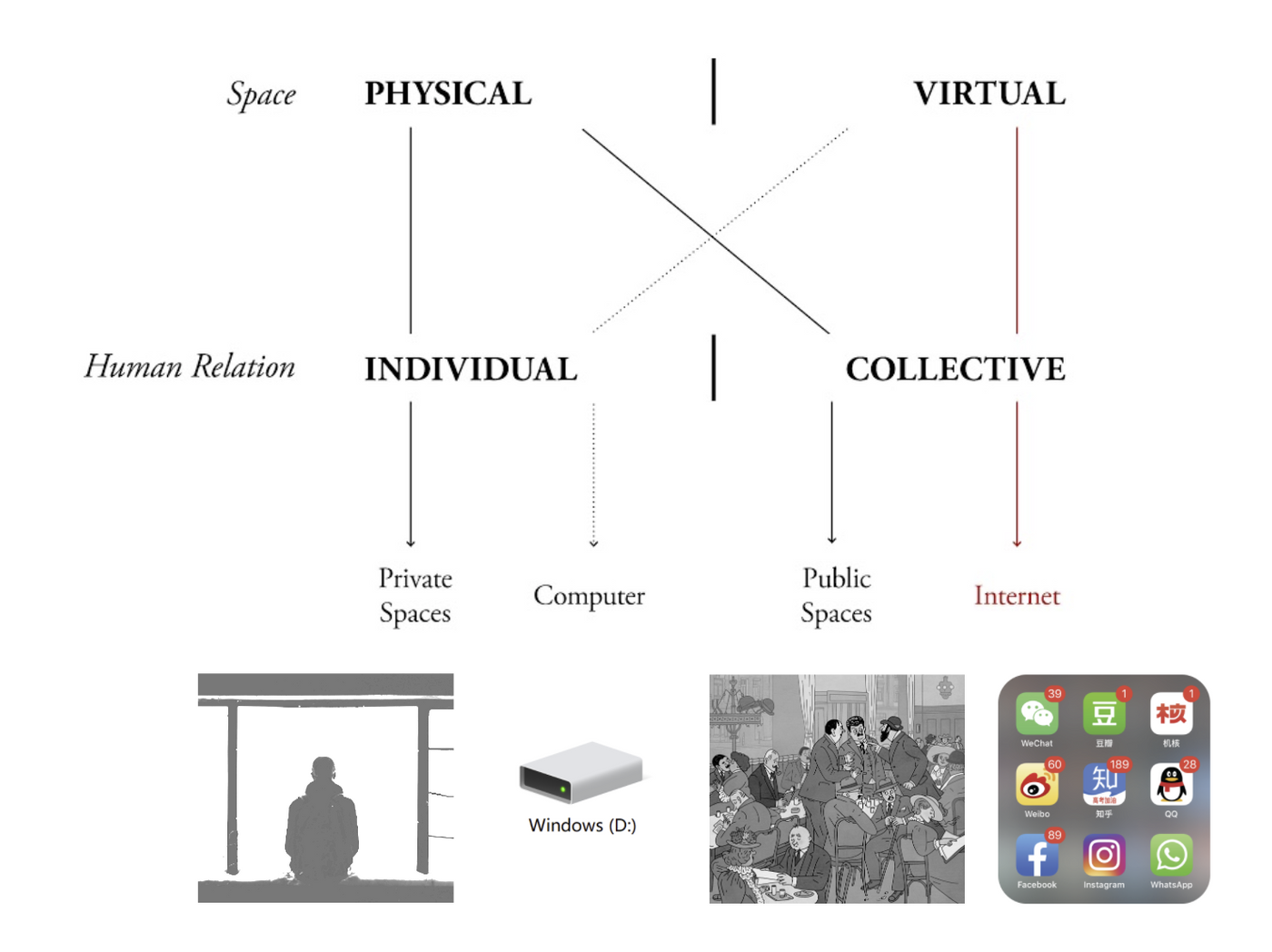
Generally speaking, both WeChat and WeChat public platforms have undoubted influence and representation. Because the amount of activity and usage of the WeChat App and the official account platform is so huge, it seems that we can see the speed, direction or some laws of the Chinese Internet information torrent here - it can be said that it reflects an online "overall" Chinese society. Our own account "Dune Research Institute" is generally based on the WeChat public platform. Many (self-)media organizations choose WeChat Official Accounts as their main base for three reasons: visibility, neutrality, and familiarity.
Similar to the situation in many foreign countries, the vast majority of users and traffic in the social media ecosystem of the Chinese Internet are gathered in a few major companies, and they do not rely on these existing platforms that everyone is used to and develop new media channels by themselves. will be very difficult. Because of this, many media are not in a hurry to create their own web pages or apps. After all, this is a bit laborious and thankless. As a “national” app with more than one billion daily active users, the WeChat public platform guarantees visibility —basic reading volume and activity.
Some other Chinese social media, such as Douban, Zhihu, Weibo, these platforms already have some relatively clear positions and discourse systems for their respective users regarding social events or some existing disciplines. There is no good or bad in these positions and words. It just means that as content creators, if you want to survive in these platforms, you need to be familiar with their respective languages to a certain extent, and learn their own "talking methods". In contrast, WeChat official accounts are relatively neutral . Of course, it is neutral. It does not mean that every content in it is neutral, but because of the huge amount of content, there are some left, some right, some low and some high, these hodgepodge is neutral A neutral appearance appeared. The advantage of this is that in this huge user volume, public accounts with different styles and attitudes can attract their respective readership groups.
Finally, many media members and creators are also WeChat users, are relatively familiar with the platform, and know how to use it to deliver content to readers more vertically and quickly.
02 WeChat App and its proper priority
As mentioned at the beginning, we roughly attribute WeChat’s initial (and even now) success to three things— prioritizing mobile phones over computers, prioritizing acquaintances over the public sphere, and prioritizing voice and images over the public domain. written text.
On a software development level: just as QQ appeared in response to the growth of home computers in 1999, WeChat appeared in 2011 in response to the growth of smartphones. QQ was built based on the PC terminal, but in the second decade of the 21st century, when people’s attention began to stay on the screen of the mobile phone rather than the screen of the home computer, it was built on the mobile terminal from the beginning. WeChat has huge advantages. In terms of architecture, it is more suitable for mobile phones, the operation is more concise and intuitive, and the mobile phone address book can be directly imported in the initial stage, which is also very friendly to new users.
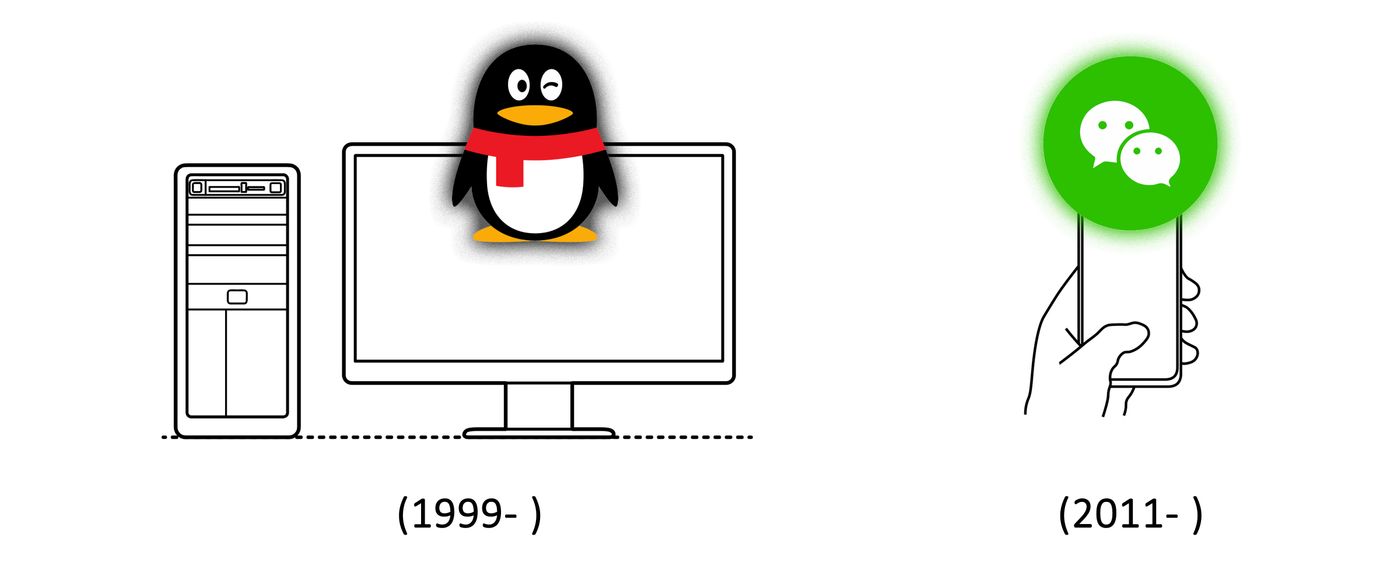
At the level of an organizational relationship: the information space provided by WeChat seems to well meet the interpersonal needs of Chinese society. In the relationship between private and public, it has found the appropriate middle ground of the acquaintance society. For example, only the mutual friends of the publisher can see the comments of one party in the circle of friends. For example, when an outsider joins in the WeChat group, it will prompt " ta and other people in the group are not WeChat friends"... These designs all help this social software become a successful "multi-center private field". WeChat can’t be too public — like Weibo, or it has the potential to nurture civic culture and civic activism, so much so that it faces too much regulation and greatly limits growth.

At the level of the medium of expression , WeChat understands what is truly "popular" communication. In the last decade, instant messaging on the Internet required users to prepare a computer with a network, be able to use a keyboard and mouse, and be able to use Chinese input methods. The proliferation of smartphones has replaced the first two requirements, but the third has not been completely revolutionized. WeChat is the first to truly launch an optimized voice function, which allows groups such as middle-aged and elderly people who have been excluded from the input method to enjoy the efficient communication brought by the Internet. This has significantly raised the ceiling of potential users of social software.

03 Distinguishing between written expression and multiple information
Attempts to “go beyond words” permeate WeChat everywhere. It can be seen in many interactive means that WeChat is downplaying the priority of written words. In the chat interface with friends, there is an obvious and easy-to-click "press and hold" button at the bottom of the chat interface; in the upper right corner of the circle of friends, the icon for content publishing is a camera - it encourages users to publish photos or short videos. content, and plain text content without pictures requires a "long press on the camera" - this is counter-intuitive and a hidden feature. For a long time, the interface also reminded users that "this feature is currently in beta."
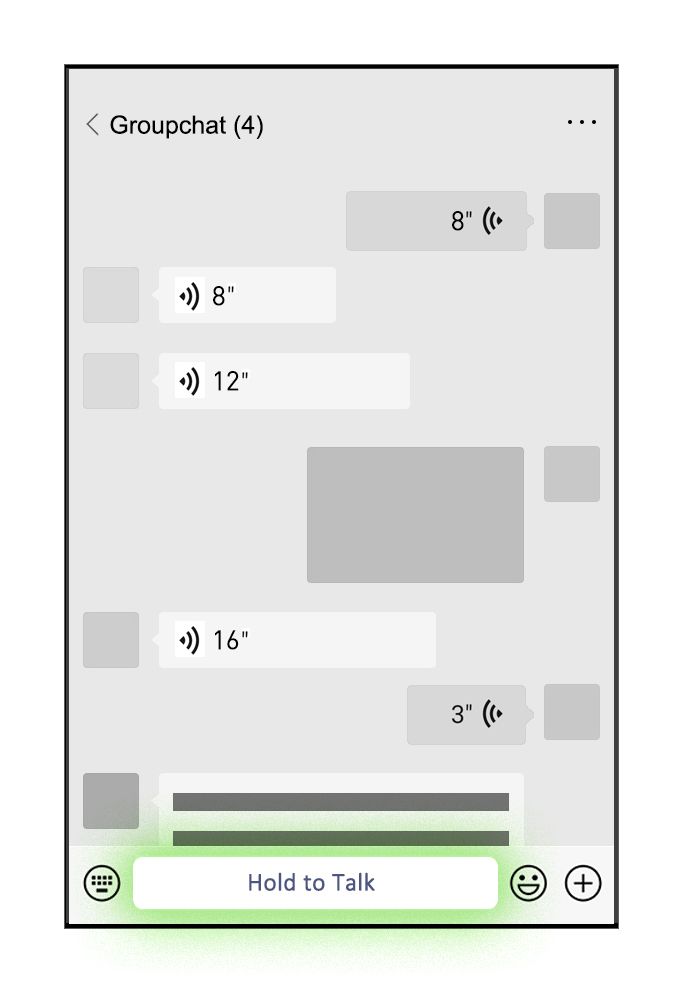
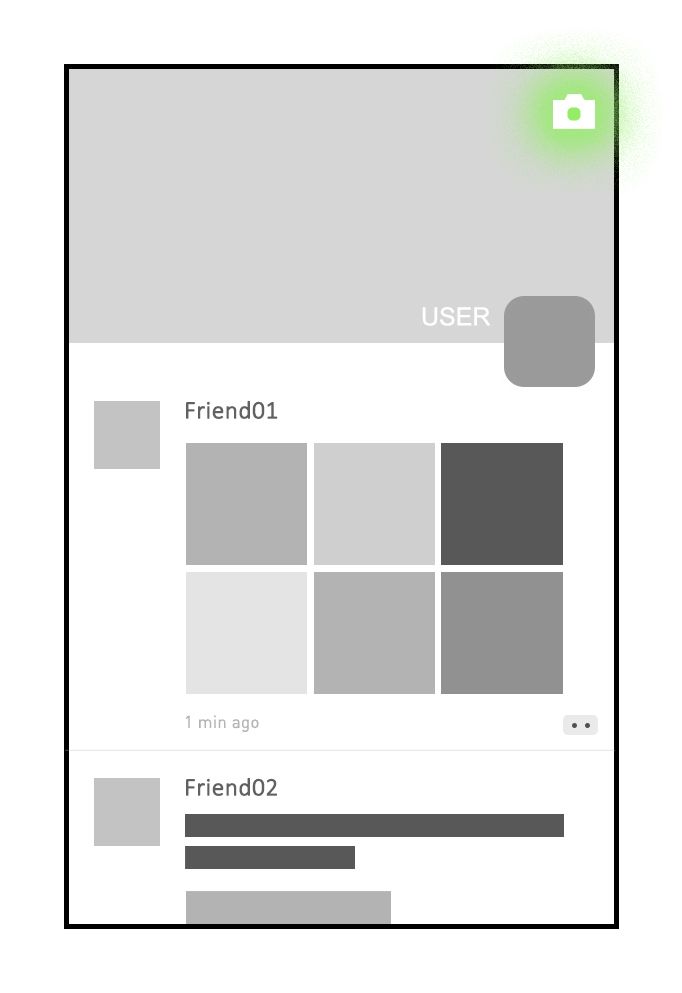
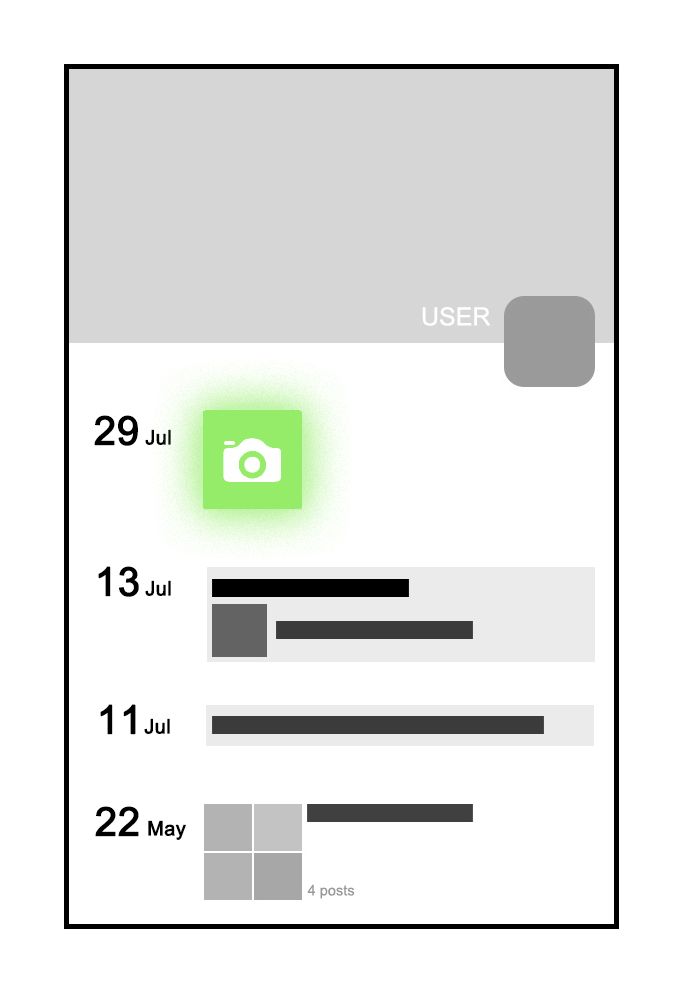
As an "aircraft carrier-level" app with more than one billion daily active users, WeChat's users range from the post-00s in first-tier cities to the post-40s in fourth- and fifth-tier cities; the readers who are reading this article are only a very small number of the total user portraits. even special sections. In fact, from a data point of view, the majority of people do not have strong writing/reading skills . Therefore, it can be said that the gesture of "beyond the text" is more friendly to most people, and will make more Chinese feel that WeChat is designed for them.
But WeChat Push is a turning point here. Because the magic is that this interface has really used "articles" as the main content creation carrier for a long time. In this context, the public platform is like an outlier in WeChat.
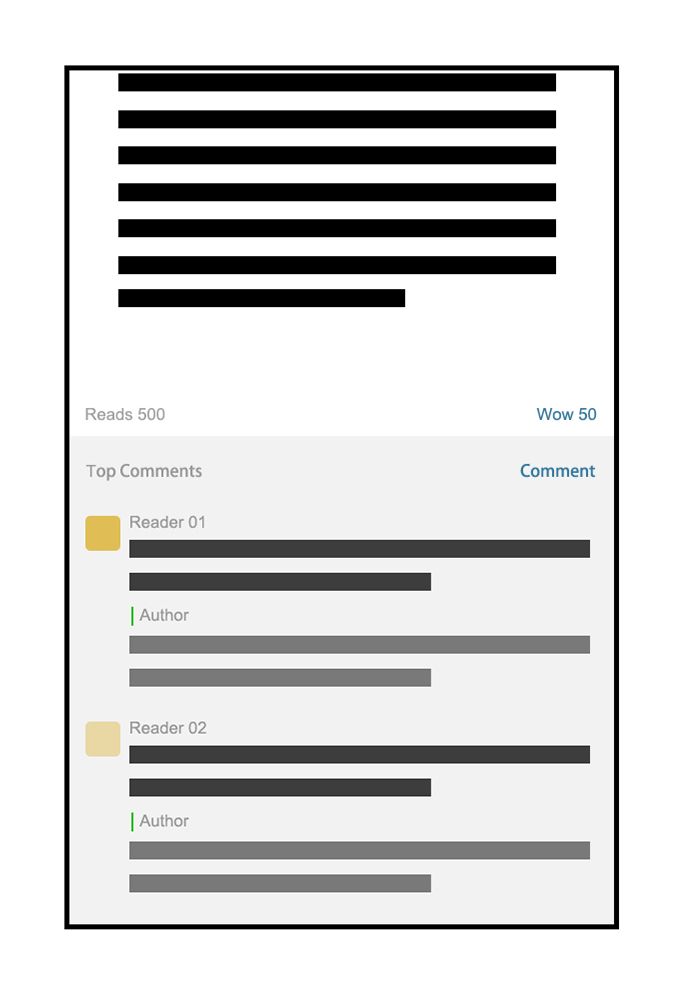
The original purpose of "replacing spam text messages" was. Since its launch in August 2012, the WeChat public platform has actually achieved the purpose of media rather than commercial promotion, and has created overwhelming texts on a large number of public accounts that are constantly being added. During the carnival, "push" has greatly changed the way Chinese people get information.
Pushing prepends the importance of written text, which seems to contradict the general direction of WeChat’s overall desire to “beyond text”. Although the reading method of waterfall flow also affects the text itself, more and more public accounts begin to use large spacing and large indentation to dilute the sense of density that the text may bring, although more and more low-quality articles have typos , wrong words, and wrong grammar, but even these broken, vulgar, inaccurate words, and fanciful words are still a medium of words.
Zhang Xiaolong responded in "WeChat Open Course PRO: 7 Thoughts on Information Interconnection" in early 2020 on the contradiction between the push of text priority and WeChat beyond text. He described and reflected on two "mistakes" by the team. First, WeChat users’ reading and pushing are all done on mobile phones, but creators’ editing and pushing can only be done on computers. “This limits the scope of content creators.” In fact, this is also consistent with the WeChat we analyzed. The guiding idea of "prioritizing the mobile terminal rather than the computer terminal" has produced certain contradictions. However, this design seems to have more complicated consequences, and should not be simply understood as a "mistake". For example, it appropriately increases the entry threshold for creators and ensures the quality of the content to a certain extent. Otherwise, the overall quality of the public account tweets Quality may be more questionable.
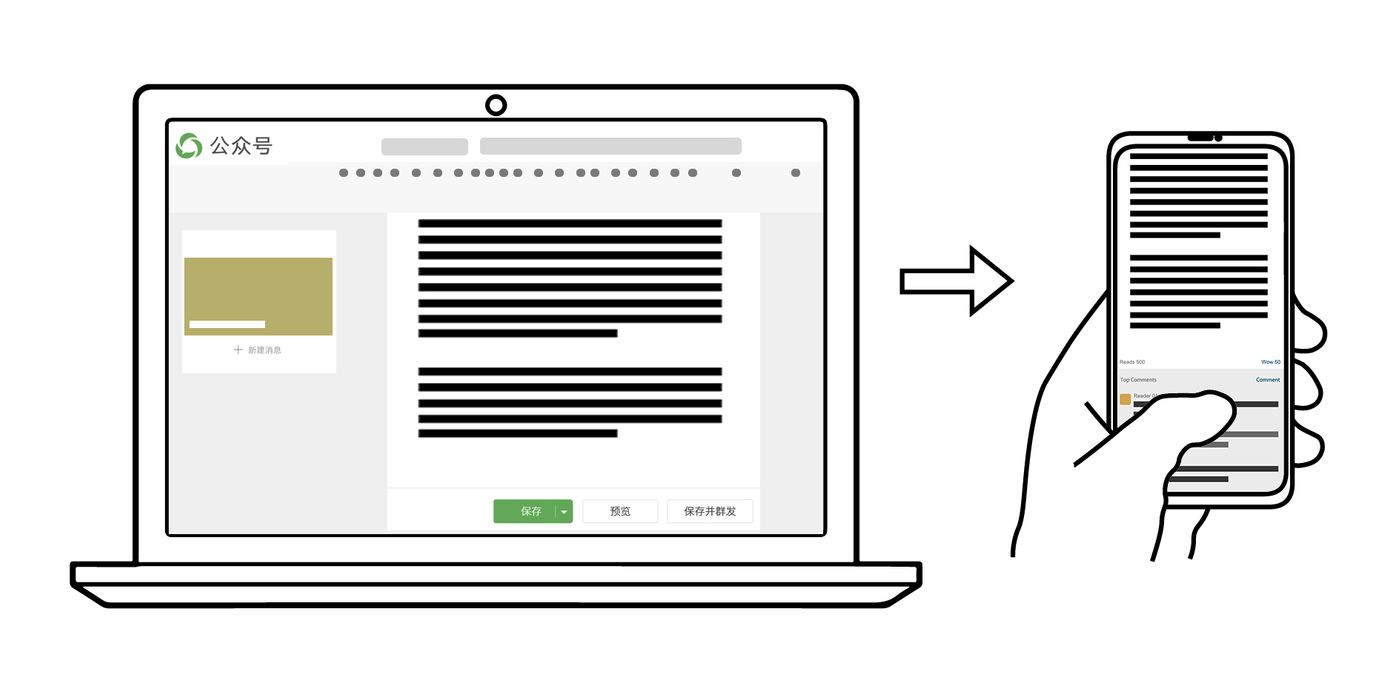
Regarding the fact that words are the main form of expression, Zhang Xiaolong expressed in "7 Thoughts on Information Interconnection":
(Push) The content of mass posting is not the point, it should be all kinds of content, such as text, pictures, videos and so on. But we accidentally made it into an article as a carrier of content , so that other forms of short content were not presented, which made us have a certain lack of short content. This is also one of the reasons why I said before that the official account itself is not prepared for the media.
04 Revisiting the Meaning of Written Words in the Information Age
The temperament and operation of an Internet team are often closely related to the founder's personality. Compared with the wolf-like culture of many other Internet teams and their unthinking worship of "growth" and "time", Zhang Xiaolong shows a relatively prudent or even restrained character; as a product, WeChat is also more cautious in its updates. and restraint. As a tool for information interconnection, he continues to think about the impact of digitization and the popularity of smartphones on the Chinese people—the same is true for the characteristics of text, voice, pictures, videos and other media themselves.
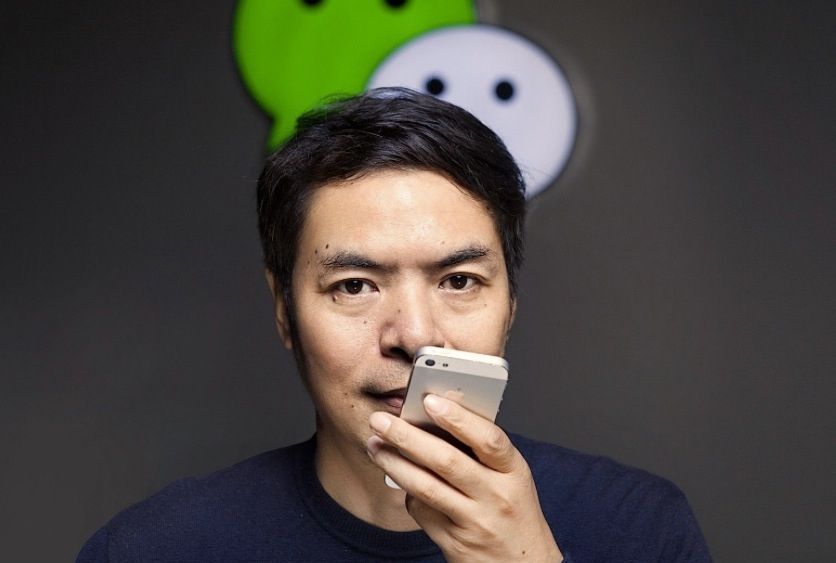
As pointed out in the WeChat Open Class, written text is not a medium that "belongs to the public." In 2020, an overemphasis on the importance of the written word is even easy to accuse of elitism. But since this article is originally about the medium of language as its core, it is still necessary to explore its meaning.
In the prosperous information space of diverse new media, written words appear "quaint", which may just reflect the resilience of words under the influence of time. Compared with many articles that tend to analyze and compare the impact of entertainment tendencies between different media on people, here we are more inclined to point out the meaning of words for publicity— a complete public domain requires words as the basic material, and try to use words as the basic material. Make sure it's not overshadowed or submerged.
Going back to the depths of history, we first wrote simple words, in addition to the meaning of sacrifice and art, the purpose was to solidify the invisible and rapidly passing memories, experiences and thoughts. From this perspective, the medium of the written word reflects the human attempt to transcend the nature of time-washing and forgetting. Especially under the theoretical system of Hannah Arendt, we can regard writing as a kind of "artifact", which is closer to "work" as transcend value than to sustain value. "labor". Written works have the potential to transcend human beings’ own short lives and fragile bodies, so that some established experiences and consensuses can be more persistent across generations.
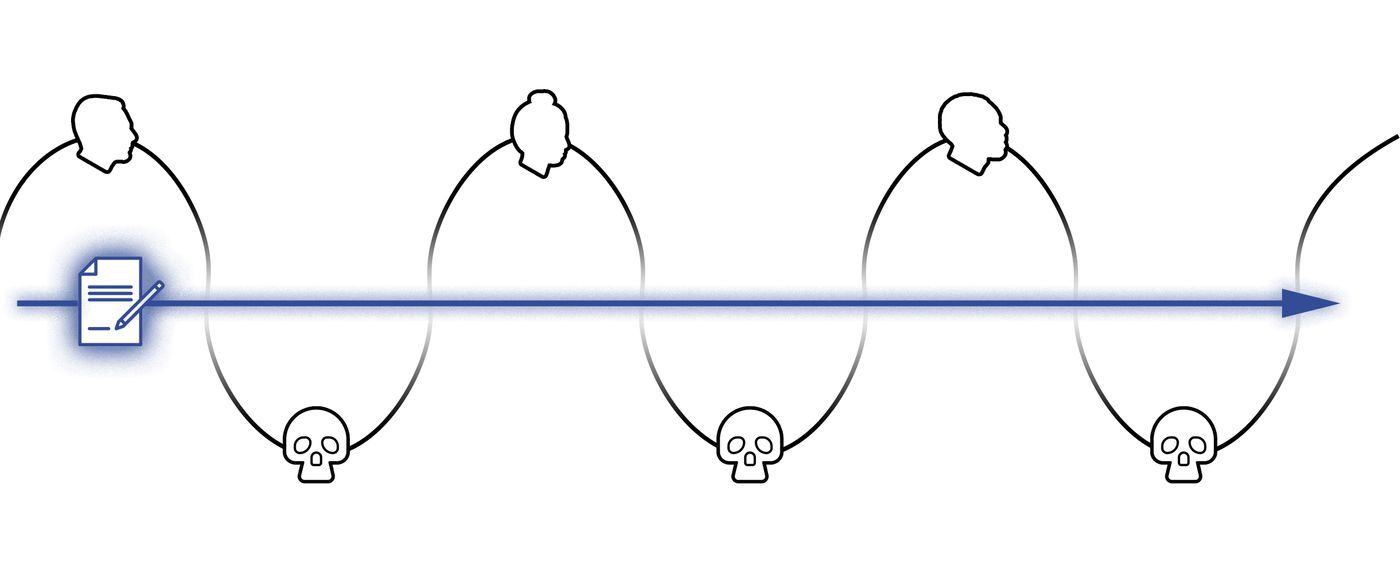
And for human beings as a group, "cosmopolitanness" requires a solid background against the constant erosion of nature. It can be said, then, that the preserved text is the testimony of the common experience, and as an important raw material, it constitutes the "reality" of the public sphere. For some events, opinions and movements, words still have irreplaceable meanings. Voice, pictures, and videos are all languages that "beyond text" and will inevitably continue to grow in the future development of the Internet, but they cannot exist independently of the basic matrix of text. As far as the non-text media expressions in the Chinese Internet are concerned, these multiple pieces of information currently do not reside in a world of things established for persistence, but rather, the content of voice, images, and videos may be due to the characteristics of their own media. , absorbed in an ever-accelerating circular cycle of production and consumption, constructing a neon-flashing landscape society. In this case, the written word remains (at least temporarily) the most effective language for dialogue, discussion, and gathering of opinions among human groups, even when moving online.
Whether it is "accidental" or not, it is certain that WeChat will indeed push the process of "beyond text" in 2020, reducing the priority of written text like making up for mistakes. The speech we quoted above was announced in January 2020, and Zhang Xiaolong also announced the "new version" at the end. Sure enough, we observed WeChat's efforts in short video content this year. Because of the huge user base, the "video account" section has become a new traffic pool that cannot be underestimated and is growing rapidly on the Chinese Internet.
Compared with previous years, the WeChat App in 2020 has been updated frequently, so we can also observe other adjustments in principle and direction. As mentioned earlier, WeChat, as a digital virtual space, does a good job of restoring China's "acquaintance society": it is organized in such a way that most people feel that their privacy is protected (at least on the surface), and the way of socializing is well aligned with real life. It also conforms to, or better cooperates with, the cybersecurity governance under our country's system because it does not generate a real "public sphere." But this year, we seem to find, oddly, that many sections within the WeChat app seem to be increasing their publicity.
There are five updates that we have observed that are more representative:
First, for the upper limit of the number of friends added, WeChat has long set 5,000 as the ceiling, but this year, this limit seems to have become softer-you can still add friends after more than 5,000 people;
Second, launch a "question and answer function" for the official account. To a certain extent, this makes up for the shortcoming that many public accounts newly registered after 2018 cannot open comment areas;
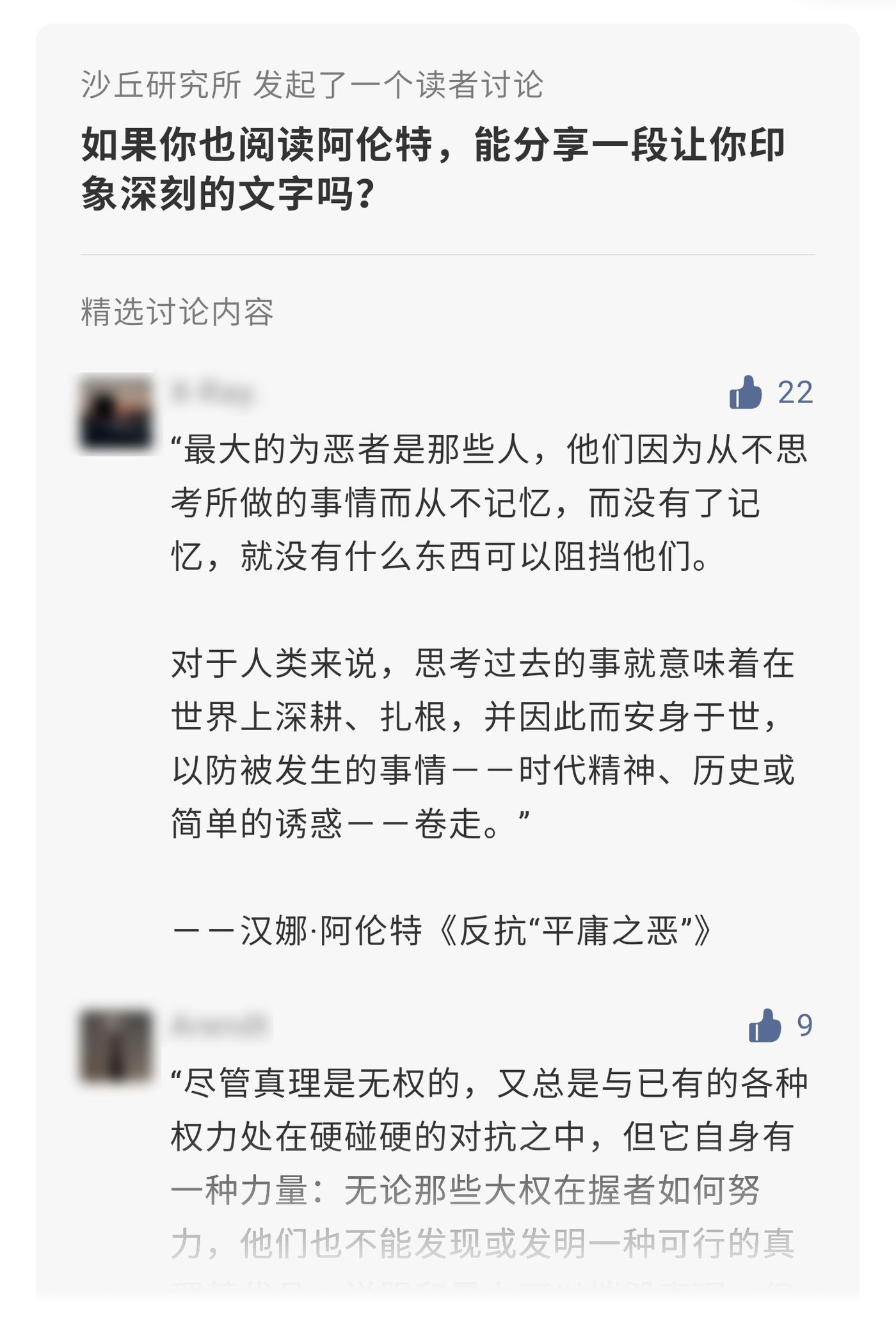
Third, in WeChat's newly launched "Circle" applet, unfamiliar users who have not added friends to each other can interact. Previously, only in the comment area below the article pushed by WeChat, strangers could see and hear each other;
Fourth, there is a comment area below the short video content of the video account, and strangers can also comment on each other;
Fifth, the "#" (hashtag) topic function has been added. Regardless of whether you enter the corresponding "#" in the official account tweet, circle of friends, video account content or chat window, a new page that collects the content of the topic can be generated.
This seemingly public increase is interesting. In the article "The Death of "Discussion" in the Chinese Internet, published by the Dune Research Institute at the end of March, we started by comparing the censorship efforts of WeChat and Douban, two content publishing platforms. Now that more than half a year has passed, it seems equally enlightening to compare the two platforms side by side. On the Douban side, the platform continues to seek to suppress the budding public sphere. One of the most typical operations is to cancel the "#" (hashtag) topic function - when Douban users want to enter this character in the broadcast, the system will automatically replace it with "*". (In 2021, # can be typed again on Douban, but it will no longer have a link.)
It should be noted that although hashtag is only a small function invented by a Twitter programmer in 2009, its powerful content organization method has played a key role in many political events and movements in the English/Western Internet, such as #ArabSpring in early years #MeToo #BLM in recent years, etc. A simple character replacement action of the Douban system has demolished all these temporary, flexible and easy-to-build topic squares ; for some hot topics of fact, it is difficult for scattered atomized users to quickly gather together to gather public opinions. To show their dissatisfaction, many Douban users added hashtag characters before and after their nicknames as a micro protest against the loss of public sex.
On the surface, the WeChat side seems to be the opposite of Douban. But if you look closely, you will find that these three public blessings are all placed on the media dominated by videos or pictures. Only the "Q&A function" in the second point is text, and we guess that's why it's so short-lived - grayscale testing started on August 18, 2020, and it was canceled without notice on November 15 - As a valid alternative to a message board at the end of a tweet, perhaps it's still too strong an incentive for "effective language."
As for the first point, WeChat has removed the upper limit of 5,000 people to add friends, but the friends added after 5,000 people are "chats only", and they do not have permission to open their circle of friends. In fact, the founder Zhang Xiaolong has also been asked many times about the limit of 5,000 WeChat users. After all, one-thousandth of users—nearly one million people are already close to the friend limit of 5,000 people. When answering a reporter's question, he sighed, "(Technically) it's very easy to expand the limit of 5,000 friends, but to be honest, we will reconsider the impact it will bring."
Assuming that a person's friends can reach 200,000 or 2 million people, then the "high-influence user"'s sharing significance in the circle of friends at this time will be more like the display significance of Weibo, and his friends will no longer chat. It is more like mutual attention or even unilateral attention. At this time, WeChat will assume the responsibility of the square-style social software and the heavy burden of the corresponding network security review, and the basic relationship structure of its "acquaintance society" will no longer be. Existence, the soil of publicity will continue to expand, which will fundamentally rewrite the nature of WeChat as a social app. It is not difficult to understand that the WeChat team will be particularly "frightened" by this upper limit. From another point of view, compared to canceling the limit of 5,000 friends, perhaps canceling the limit of 500 people in WeChat group chat will be an action that has a more direct impact on publicity, that is, something that will not happen.
05 Media Changes and the Fluctuation of Publicity
Combining some of the observations and analyses listed above, it can be seen that the WeChat team has enhanced the possible interaction between users on the one hand, and on the other hand, it has also subtly prevented the creation of a real public domain. From a certain point of view, "Beyond the Word" is likewise two sides of the same coin— friendly to popular culture while simultaneously deprioritizing potentially more serious content . In this way, when the power of words exists, public areas such as comment areas are strictly limited, and when the publicity gradually increases, the power of words is obscured by other media.
Geographically, the WeChat team in Guangzhou is probably not an active participant or thinker in the field of politicization and ideology. But even in the race of Internet companies, WeChat should not and cannot completely ignore politicized considerations, because in this country, it is already a (most) important place for "talk". Therefore, every small action and small decision of the team will not only affect the business paradigm of online shopping malls, but also profoundly affect the existence and loss of publicity. "Where speech is in danger, things become political in nature, for speech makes man a political being. (Hannah Arendt, foreword to The Human Condition) "
For a long time, the written word was the foundation of all other media, and the confusion of language led to the confusion of culture. In the foreseeable future, text will gradually decrease its priority in the WeChat ecosystem, and will be in a more vulnerable position in the war of attention grabbing. Other forms of "multiple information" will further dilute the weight of written words, making the "reality" of the digital public sphere worth reconsidering. Just like the sincere expression in the public lecture: "WeChat is a basic information transmission tool or platform, an inadvertent action may cause changes in the flow of information torrents." Indeed, WeChat's decision-making on its own information space will It has a directional impact on the entire Chinese Internet.
"The official account is not for the media." - This reiteration of the WeChat team may have far greater wisdom than its seemingly technical and stylized statement. When the content carried by a platform is commercialized, operators will feel relatively safe, because the platform can and should follow the basic rules of a business contract, and it will be more sustainable; but when a large platform becomes a media, it becomes a Where effective language is organized and published, it will slide from the chess game of capital to the realm of politicization, and will carry many uncontrollable factors. Because different individuals can come together and "talk to each other, understand each other, and make themselves understand" , this "plurality" creates the third root besides "labor" and "work" in Arendt's discourse Sexual human activity: "action". And action will open up new things. "Actions" are unpredictable, and even the cooperating actors have no control over the consequences of events in the end, and the outcome may well not be what the actors intended. This contingent, unique, threat of "new beginnings" breaking the chain of previous events deserves a lot of panic for operators. Therefore, if the "beyond the text" move can successfully dilute the serious media significance of the official account platform, WeChat can also grow more safely under supervision.
In terms of publicity, the article seems to show a stubborn admiration for words. The reason for this is the proof that the time that has passed has given us. Obviously, non-literal media are not completely without public seriousness. We can imagine voices, pictures, and images as key evidence in court trials, as important catalysts for people to connect and unite. However, we can't imagine the absence of words. regulations, declarations, or constitutions. These crucial, core records and "appearances" of "presence for others" still need to be written down. Some things are written so that we can infer that these beliefs are no longer mortal, that they are no longer just plans for a generation.
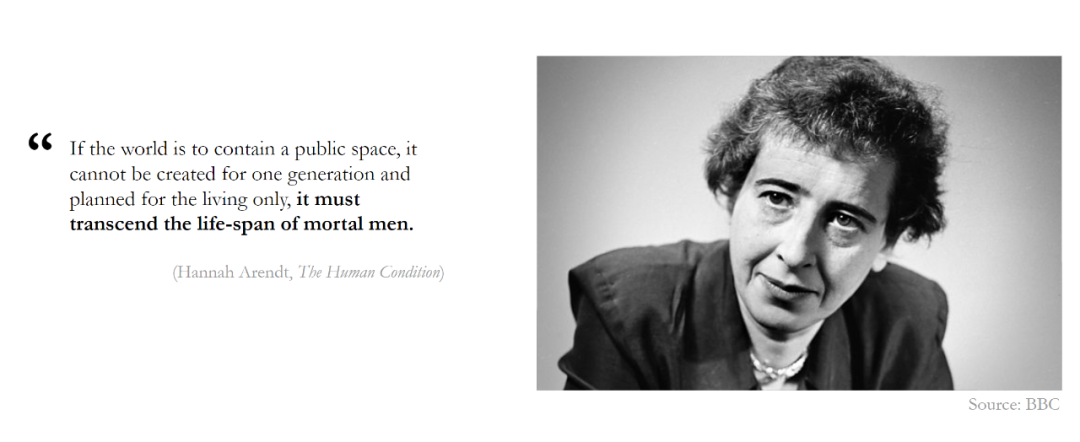
In the current environment, it remains to be seen whether the non-literal media of the digital world have any signs of a more serious meaning. If these "transcendental" mediums remain witty, fantastic, and interesting, they remain only "private objects" in the digital age. Even if their "so-called charm extends to all people, it does not mean that it becomes a public thing and does not constitute a public sphere." It must be noted that "the public sphere can be great, but it just cannot be charming. (Hannah Arendt, "The Human Condition" "7. The Public Domain: Common") "
But our past experience may not constitute all the reasoning for the future of cyberspace. Just like we must realize that the existence of WeChat has greatly lowered the height of the Chinese people's first threshold to the digital world - because WeChat has such a profound understanding that the medium beyond words is the real language of the masses, and many have been excluded from this new world before. Only individuals outside the world can open their first app without fear, difficulty or defense, and in this ecosystem, they can gradually learn all kinds of basic skills in the digital age and realize that the digital age can bring them of new things.
The act of deliteration is a basic entry - as we have analyzed in past articles, human history has never had a public sphere that truly encompasses all individuals. The city-states of ancient Greece rejected women, slaves and gentiles, and the participants in 19th-century French salons, cafés or street gardens were mostly intellectuals from the emerging bourgeoisie and established cultural circles. At this level, words—whether written or spoken—become a rule of exclusion, because only a handful of people who make good use of it can actually step into the room where serious issues are being discussed and recorded . WeChat accommodates users of different ages, incomes, and cities, and achieves the presence of as many Chinese as possible in the digital world with an unprecedented degree of completion. It would be unfair to ignore the public value of this achievement alone.
In a civilized society, there is no area that does not require restrictions. "The democratic power of the masses, like all personal power, can easily turn into its opposite and become a tyrannical power when it is not properly restrained by the constitution. (Fonkeley, "The Crowd" For the public sphere in the digital age, constraints must be necessary; of course, such constraints must also be justified.
No cyborg ideal will fall from the sky, and not every individual who has the opportunity to speak will naturally understand what "public discussion" is. If there is a structural lack of public places, people will be even less trained in public discussion. What makes for a good discussion? The "critical reasoning" of Habermas or the "sublation" of Hegel's "dialectics" both require us to be clear about the boundaries of the topic and to respect what others already have. Discuss, identify possible ambiguities in questions and possible complex steps in the inference process . However, if there is no such training or enlightenment, the group will embody violence and absolutely "presumptious" speech - as long as you encounter a voice that is different from your own intuition, you must hate, fight, expose , report, besiege, until the other is completely eliminated.
At this point, an important question is: When the "Beyond Words" effort welcomes more members, can the medium of "Beyond the Words" foster better discussions? Or is the move just turning a place where the media might have a voice and people come together to hear each other into a more purely consumption and entertainment-led place?
We still conclude with Arendt's wisdom (Hannah Arendt, "The Human Condition" "28. Power and Manifestation Space")—
Wherever people speak and act together, manifest spaces are formed. . . . Wherever people come together, it is potentially there, but only potentially, not necessarily, forever. Only where words are not divided, words are not empty, and actions are not rude, where words are not used to conceal intentions but to reveal reality, and where actions are not used to insult and destroy but to build relationships and create new realities , power can be realized.
Like my work?
Don't forget to support or like, so I know you are with me..
Comment…